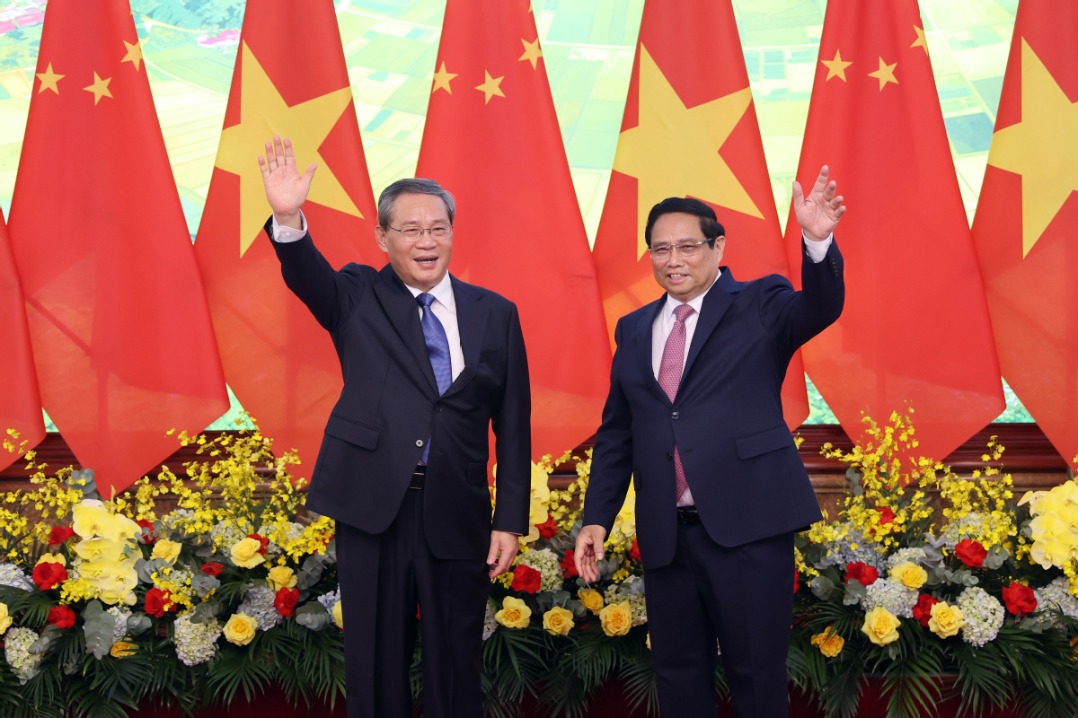Model for Africa


LI MIN/CHINA DAILY
China's National Day is an exemplary example for nations of the Global South that are striving for economic transformation
China's National Day, celebrated on Oct 1, commemorates the founding of the People's Republic of China in 1949. The first celebration took place in Beijing's Tian'anmen Square, where Chairman Mao Zedong proclaimed the founding of the PRC and raised the first national flag of New China.
Since then, National Day has become a major public holiday in China, being celebrated with grand parades, fireworks and various cultural and patriotic events. The holiday kicks off a week-long vacation known as "Golden Week" since 1999, during which many Chinese people travel domestically and internationally. Over the years, the National Day holiday has evolved to become not only a celebration of the founding of the PRC but also a reflection of China's rapid development and achievements. It serves as a reminder of the country's journey from a war-torn nation to a global economic powerhouse, fostering a sense of national pride and unity among the Chinese people, which is an exemplary model for nations of the Global South that are striving for economic transformation.
China's journey from being one of the poorest countries in the world to a global economic powerhouse is a remarkable journey celebrated globally. This transformation, which began with the transition to a market economy in 1978, offers valuable lessons for South-South cooperation, specifically for African nations striving to maximize their economic transformation in their current post-colonial era.
Before 1978, China faced severe economic challenges. At around $156, China's per capita GDP was less than one-third of the average for sub-Saharan African countries, which stood at approximately $490 at that time. Exports accounted for only 4.1 percent of GDP, and imports 5.6 percent. A staggering 75 percent of exports were agricultural or processed agricultural products, showing the then dependence of the economy on agriculture. About 81 percent of the population lived in rural areas, with more than 70 percent of the labor force engaged in agriculture. Additionally, 84 percent of the population lived below the international poverty line.
The economic reforms initiated in 1978 set China on a path of rapid growth and development. For decades after that, the average annual GDP growth rate was an impressive 9 percent, and the average annual foreign trade growth rate was 14 percent. As a result of these reforms, China achieved several significant milestones: by 2010, China had become the second-largest economy in the world and the largest exporter, with more than 95 percent of its exports being manufactured goods. By 2021, China's per capita GDP had risen to $12,551.
The recently concluded Third Plenary Session of the 20th Central Committee of the Communist Party of China emphasized deepening reforms to advance Chinese modernization, focusing on economic development, innovation, urban-rural integration, and improving people's well-being. Key goals include establishing a high-standard socialist market economy by 2035 and building a great modern socialist country by 2049.
Looking forward, China aims to complete significant reform tasks by the 80th anniversary of the People's Republic of China in 2029.
These past performances and future plans offer several key lessons for African countries. Embracing market-oriented reforms can drive significant economic growth. Moving from an agriculture-based economy to one focused on manufacturing and services can enhance economic stability and growth. Actively participating in global trade can boost economic performance. Improving access to education and healthcare is crucial for sustainable development. Investing in infrastructure can facilitate economic activities and attract foreign investment.
The wave of independence that swept across Africa in the mid-20th century marked a significant turning point in the continent's history. Between 1957 and 1962, numerous African nations gained independence from their colonial rulers, starting with Ghana in 1957, which set a precedent for others to follow. This period, often referred to as the "Year of Africa" in 1960, saw 17 countries achieve sovereignty. The struggle for independence was characterized by a mix of peaceful negotiations and violent conflicts, reflecting the diverse experiences of African nations as they sought to reclaim their autonomy and identity. Among African nations, Ethiopia and Liberia stand out as unique cases. Ethiopia successfully resisted colonization by European powers, maintaining its sovereignty except for a brief occupation by Italy from 1936 to 1941. Liberia, founded by freed American slaves in the 19th century, also avoided colonization, establishing itself as a republic in 1847.These countries' ability to remain independent amid widespread colonization highlights their unique historical and geopolitical circumstances, which allowed them to navigate the pressures of imperialism differently from their neighbors.
The post-independence era in Africa has been a period of significant transformation and challenges. Newly independent nations faced the daunting task of building stable governments, fostering economic development, and addressing social inequalities. Despite these challenges, many African countries have made remarkable progress, leveraging their independence to pursue development goals and strengthen their positions on the global stage. The experiences of Ethiopia and Liberia, alongside the broader decolonization movement, continue to inspire contemporary efforts toward self-determination and sustainable development across the continent.
When African nations celebrate their national day, they can draw inspiration from China's experience to chart their own paths toward economic prosperity and global integration. By learning from China's successes and challenges, African countries can harness their independence to build robust, diversified and resilient economies that benefit all their citizens and beyond, making the aspirations of the South-South cooperation a reality.
The author is a PhD student at Peking University, ex-state minister of planning and development of Ethiopia and ex-secretary general of the Ethiopian Chamber of Commerce and Sectoral Associations. The author contributed this article to China Watch, a think tank powered by China Daily.
Contact the editor at editor@chinawatch.cn.
































